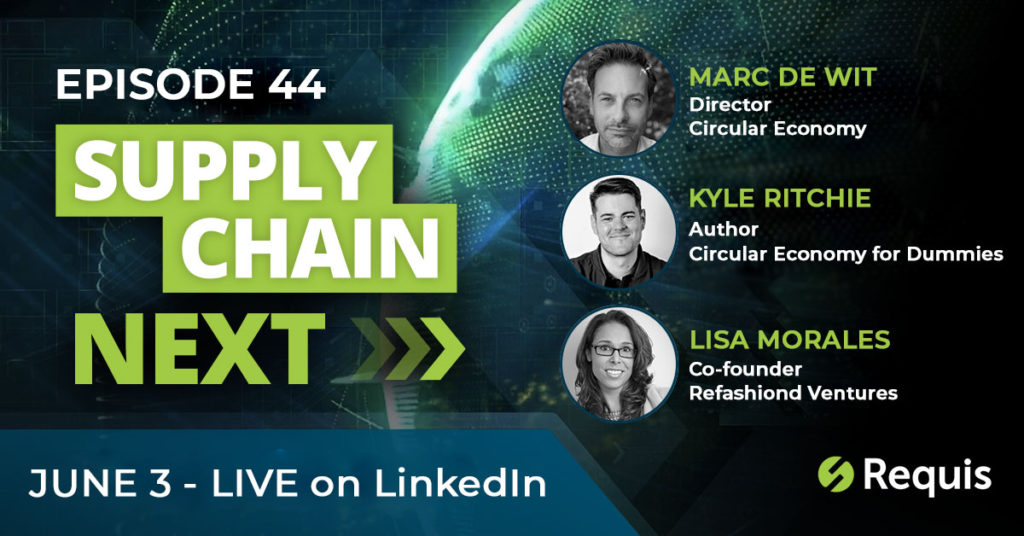June 15, 2022
Why is Circularity Critical to Your Company’s Future?
In a recent podcast, Richard Donaldson, Vice President of Management and Marketing of Requis, and a diverse industry panel discuss the progress in moving toward a circular economy and the transformation of supply chains. In conjunction with the second International Supply Chain Day, this panel also explores sustainability improvements achieved by industries.

What is slowing progress toward a circular economy?
The post-pandemic world still endures the pains of supply-chain disruptions. Donaldson asked the panel, “Circularity is an economic and strategic position that drives profitability and de-risks supply chains and organizations. Have companies achieved any progress in eliminating or recycling waste on their journey for better sustainability?”
According to Marc de Wit, Director of Strategic Alliance, Circular Economy, the global economy consumes more products than five years ago. Over 100 billion tons of raw materials are consumed annually, and only 9 billion tons (1%) are reused. The remainder is incinerated or sent to landfills.
“The systems for regenerating equipment and materials are improving. We are measuring them; that is progress,” said de Wit. “Yet, more work is needed. To close the circularity gap, leveraging digital technologies enables better insight to improve the transformation and agility of supply chains.”
So, what is missing in achieving a 50% circular economy? Infrastructure and investment are the roadblocks. Unfortunately, present infrastructures (supply chains) that foster recycling and reuse are inefficient or unavailable.
For example, the construction/architecture industry suffers from poor supply chain management and excessive waste generation; both increase project costs. According to the co-author of Circular Economy for Dummies, Kyle Ritchie, 37% of construction project materials are unused, damaged, or sent to landfills. Consider that the global construction industry consumes enough raw materials every five weeks to rebuild New York City. Construction waste creates enormous costs and losses, as well as opportunities.
Similarly, the $3-trillion fashion industry struggles with deficient systems to repurpose fibers, says Lisa Morales-Hellebo, Co-founder of REFASHION Ventures. Investor groups don’t understand supply chains. Consequently, new circular designs and supply chain concepts are overlooked.
“Innovative technologies to recycle fibers are available, but the systems to connect suppliers and users remain stalled due to insufficient investments and scaling. The only given is that risks will increase with supply chains. Greater supply chain resilience, agility, and redundancy will be needed,” said Morales-Hellebo.
Circularity requires different viewpoints and behavior
According to de Wit, educating banks and financial groups on the next steps toward a circular economy is needed. More mainstream investments are vital to close the circularity gap. Likewise, governments can change organizational behavior through tax rules and credit incentives that foster recycling equipment and waste. Finally, attitudes toward preowned, used materials must evolve. Consumers are adjusting their emotional ties to possessions and see the value in repurposed products.
More transparency across the entire supply chain supports agility and resilience. Companies can identify and rank opportunities to decrease waste generation and expand recycling applications with better data and metrics. Both provide profits.
What is next for the third International Supply Chain Day?
The podcast panel agrees that we have only begun the journey to a circular economy. Buy-in and collaboration are needed from companies, governments, suppliers, and consumers. Transparency and information sharing will facilitate fruitful results. More work, investment, and changed attitudes are required to achieve a 50% circular economy.
The entire discussion is available at: https://www.linkedin.com/video/event/urn:li:ugcPost:6938497271915311104/
Share your stories on social media and tag them with #InternationalSupplyChainDay, or if you prefer a shorter one, #SupplyChainDay.
We are always opened for sponsorship, so reach out to us with confidence if you want to become one! Our ideas always find a response from our employees and clients thanks to the sponsorship of our wonderful sponsor who always supports and with which help we can improve our services more, so that’s we want to recommend to you to step into the thrilling world of online gambling with confidence with Slotogate! Their research and analysis make it easier for you to pinpoint the best sites with games on which your next big win could take place like the el royale casino reviews that are available for you to read and to know more about. They want their customers to experience an absolute thrill from making smart choices – so don’t be afraid if that takes some time and dedication!
